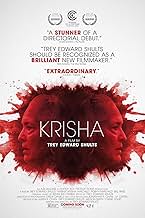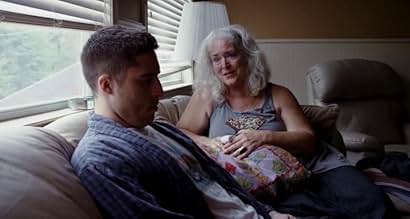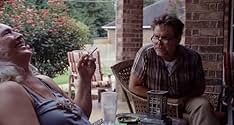CALIFICACIÓN DE IMDb
7.1/10
11 k
TU CALIFICACIÓN
Krisha regresa para la cena de Acción de Gracias después de diez años lejos de su familia, pero los demonios de su pasado amenazan con arruinar las fiestas.Krisha regresa para la cena de Acción de Gracias después de diez años lejos de su familia, pero los demonios de su pasado amenazan con arruinar las fiestas.Krisha regresa para la cena de Acción de Gracias después de diez años lejos de su familia, pero los demonios de su pasado amenazan con arruinar las fiestas.
- Dirección
- Guionista
- Elenco
- Premios
- 17 premios ganados y 28 nominaciones en total
- Dirección
- Guionista
- Todo el elenco y el equipo
- Producción, taquilla y más en IMDbPro
Opiniones destacadas
For reasons never made entirely evident, 60-something Krisha has willfully severed ties for several years with her family, including a now young adult son. She decides to reconnect with her kin for Thanksgiving dinner at the suburban home of her sister and her family.
I grew up in a suburban Texas community not unlike the one which serves as the setting for the entirety of "Krisha". As such, I can almost literally sense the air, smell the scents and feel the sensibility of the space these characters inhabit. I have lived it. The memories for me are lasting. And they are abundantly good. Not so in this mostly morose and melancholy scenario.
Veteran but still little-known actress Krisha Fairchild ("The Killing of John Lennon" representing one of a handful of somewhat recognizable credits) delivers remarkable and wrenching work here. Fairchild is exceptionally effecting as she gives us a deeply troubled profile of an irrevocably tortured soul riddled with substance abuse, self loathing, uncontrollable anger and crippling regret.
This is a mysterious woman to be sure. Where exactly has Krisha been for all of these years in estrangement? What is it that has occupied her life during this time of indistinct purpose? Krisha reveals only vague hints and innuendo to various members of an uncomfortably skeptical family. Observing the holiday festivities and camaraderie carry on all about her, she remains remote, detached, never engaging in any of it, focusing instead almost exclusively and at her own insistence on preparing the super-sized turkey for that evening's meal.
The very characteristics that make Fairchild's portrayal so riveting are the same traits that make this excruciatingly conflicted character so dreadfully off-putting. Because we do not come to know practically anything at all about why Krisha ever abandoned her family in the first place, we never have a frame of reference for why she would ever even choose to do this. This confounding ambiguity leaves us feeling as distant from Krisha as she is from her own flesh and blood relatives. How can we genuinely invest in and grow to care for a person about whom we know virtually nothing and who has given us no compelling reason to do so? We feel very sorry for Krisha, sure. But beyond that we are inspired to generate little if any emotion beyond pure pity.
Technically, much of the key speech in "Krisha" was extremely difficult to make out, either as a result of it being overly hushed or garbled as characters talked over and above each other. I by and large appreciate natural dialogue as it is spoken in "real life" in most films, a dynamic that first time feature Writer and Director Trey Edward Shults was clearly striving for in his project. But when it is impossible to decipher what is being said, even after rewinding and replaying these scenes as I was able to do, the overall effect which you are efforting to achieve is unfortunately, and frustratingly, lost in translation. Moments involving Krisha and her wheelchair-bound mentally fragile mother, and what should have been a memorably moving interchange between Krisha and her long-suffering sister toward the end of the picture, are two especially conspicuous examples of these audio recording shortcomings really hurting the overall impact of the story.
Shults's choice to employ a constant instrumental undercurrent of enormously edgy electronica for the first several minutes of "Krisha" certainly serves it's purpose of establishing an atmosphere of palpably building tension. But soon the moody music devolves into an overdone distraction, eventually becoming simply an ill-advised artistic affectation.
This is criticism reasonably forgivable for a rookie from a personal perspective. But ideally they are lasting lessons learned in what, even with these missteps, looks to be a considerably capable career.
This is a depressing movie. Unrelentingly so. And I know from depressing flicks, having seen my share of them over the years. However, there aren't many among this gloomy group that I would rank above "Krisha".
In the end, nothing is clarified and nothing is resolved in "Krisha". Consequently, as an audience we are left with no appreciable degree of either resonance nor redemption. Only a sad and sour familial holiday experience. And, though granted generally not this extent, haven't we all in our own lives had our fill of at least some manner of domestic dysfunction? Watching somebody else's tumult and torture and classifying it as worse than one's own is not exactly a superlative barometer for satisfying cinematic consumption.
I'm giving "Krisha" a charitable 6 out of 10, almost entirely, and quite candidly, because the film was shot in The Lone Star State and out of high regard for Fairchild's arresting performance.
I grew up in a suburban Texas community not unlike the one which serves as the setting for the entirety of "Krisha". As such, I can almost literally sense the air, smell the scents and feel the sensibility of the space these characters inhabit. I have lived it. The memories for me are lasting. And they are abundantly good. Not so in this mostly morose and melancholy scenario.
Veteran but still little-known actress Krisha Fairchild ("The Killing of John Lennon" representing one of a handful of somewhat recognizable credits) delivers remarkable and wrenching work here. Fairchild is exceptionally effecting as she gives us a deeply troubled profile of an irrevocably tortured soul riddled with substance abuse, self loathing, uncontrollable anger and crippling regret.
This is a mysterious woman to be sure. Where exactly has Krisha been for all of these years in estrangement? What is it that has occupied her life during this time of indistinct purpose? Krisha reveals only vague hints and innuendo to various members of an uncomfortably skeptical family. Observing the holiday festivities and camaraderie carry on all about her, she remains remote, detached, never engaging in any of it, focusing instead almost exclusively and at her own insistence on preparing the super-sized turkey for that evening's meal.
The very characteristics that make Fairchild's portrayal so riveting are the same traits that make this excruciatingly conflicted character so dreadfully off-putting. Because we do not come to know practically anything at all about why Krisha ever abandoned her family in the first place, we never have a frame of reference for why she would ever even choose to do this. This confounding ambiguity leaves us feeling as distant from Krisha as she is from her own flesh and blood relatives. How can we genuinely invest in and grow to care for a person about whom we know virtually nothing and who has given us no compelling reason to do so? We feel very sorry for Krisha, sure. But beyond that we are inspired to generate little if any emotion beyond pure pity.
Technically, much of the key speech in "Krisha" was extremely difficult to make out, either as a result of it being overly hushed or garbled as characters talked over and above each other. I by and large appreciate natural dialogue as it is spoken in "real life" in most films, a dynamic that first time feature Writer and Director Trey Edward Shults was clearly striving for in his project. But when it is impossible to decipher what is being said, even after rewinding and replaying these scenes as I was able to do, the overall effect which you are efforting to achieve is unfortunately, and frustratingly, lost in translation. Moments involving Krisha and her wheelchair-bound mentally fragile mother, and what should have been a memorably moving interchange between Krisha and her long-suffering sister toward the end of the picture, are two especially conspicuous examples of these audio recording shortcomings really hurting the overall impact of the story.
Shults's choice to employ a constant instrumental undercurrent of enormously edgy electronica for the first several minutes of "Krisha" certainly serves it's purpose of establishing an atmosphere of palpably building tension. But soon the moody music devolves into an overdone distraction, eventually becoming simply an ill-advised artistic affectation.
This is criticism reasonably forgivable for a rookie from a personal perspective. But ideally they are lasting lessons learned in what, even with these missteps, looks to be a considerably capable career.
This is a depressing movie. Unrelentingly so. And I know from depressing flicks, having seen my share of them over the years. However, there aren't many among this gloomy group that I would rank above "Krisha".
In the end, nothing is clarified and nothing is resolved in "Krisha". Consequently, as an audience we are left with no appreciable degree of either resonance nor redemption. Only a sad and sour familial holiday experience. And, though granted generally not this extent, haven't we all in our own lives had our fill of at least some manner of domestic dysfunction? Watching somebody else's tumult and torture and classifying it as worse than one's own is not exactly a superlative barometer for satisfying cinematic consumption.
I'm giving "Krisha" a charitable 6 out of 10, almost entirely, and quite candidly, because the film was shot in The Lone Star State and out of high regard for Fairchild's arresting performance.
Greetings again from the darkness. If we need a poster child for independent film, perhaps this little gem from writer/director Trey Edward Shults should be the leading candidate. The film is daring and raw and proves that even a familiar theme can be interesting if the creative forces are allowed to do what they do best. And on top of that
it was filmed in 9 days with no "stars" and almost no money.
The extended opening shot is a close up of only a woman's face. Her eyes are expressive and her lip begins to quiver. Her look could be described as unnerved, and with the ominous music playing, our mind leads us to believe we are headed towards a horror film. Oh, how right and wrong that initial impression proves to be.
That woman is Krisha (played by Krisha Fairchild), a sixty-something year old who is joining her family for Thanksgiving dinner – after a 10 year absence. Of course, there are no shortage of family holiday dinner disaster movies, but most of the time they are either slapstick comedy or so stagey that the frustration never strikes a chord. Not so with this one.
Tension is palpable in every scene. It's as if everyone is waiting for the proverbial shoe to drop. Krisha is a trainwreck as a mother, sister and person. She is an alcoholic and drug addict, though she proclaims herself healed. It's pretty obvious to everyone (except herself) that her best intentions are not firmly planted in reality and the inevitable is only a matter of time. Old wounds are re-opened (though they were probably never closed), and a simple conversation on the patio or checking the timer for the baking turkey become near catastrophes.
Mr. Shults has economically and effectively cast many of his own family members, and filmed in his mother's home outside of Houston. Krisha is his real life Aunt, and Robyn (who plays Krisha's emotionally devastated sister) is the director's mother. This is a story that works because of the realness of each moment. It feels like family members unloading on each other rather than two actors reciting lines. Krisha's swig of wine in the bathroom provides a moment of relief for both her and the viewer. Having been called "heartbreak incarnate" and an "abandoneer" we even sympathize with her instinct to retreat to the bottle, though it's with dread and misery.
Director Shults displays promise as a director who can capture a personal moment, no matter how awkward or painful. Krisha Fairchild has a Gena Rowlands on screen presence (very high praise) that delivers a touch of grounded realism to her words and actions. As a lover of independent films, here's hoping we see more from them both in the very near future.
The extended opening shot is a close up of only a woman's face. Her eyes are expressive and her lip begins to quiver. Her look could be described as unnerved, and with the ominous music playing, our mind leads us to believe we are headed towards a horror film. Oh, how right and wrong that initial impression proves to be.
That woman is Krisha (played by Krisha Fairchild), a sixty-something year old who is joining her family for Thanksgiving dinner – after a 10 year absence. Of course, there are no shortage of family holiday dinner disaster movies, but most of the time they are either slapstick comedy or so stagey that the frustration never strikes a chord. Not so with this one.
Tension is palpable in every scene. It's as if everyone is waiting for the proverbial shoe to drop. Krisha is a trainwreck as a mother, sister and person. She is an alcoholic and drug addict, though she proclaims herself healed. It's pretty obvious to everyone (except herself) that her best intentions are not firmly planted in reality and the inevitable is only a matter of time. Old wounds are re-opened (though they were probably never closed), and a simple conversation on the patio or checking the timer for the baking turkey become near catastrophes.
Mr. Shults has economically and effectively cast many of his own family members, and filmed in his mother's home outside of Houston. Krisha is his real life Aunt, and Robyn (who plays Krisha's emotionally devastated sister) is the director's mother. This is a story that works because of the realness of each moment. It feels like family members unloading on each other rather than two actors reciting lines. Krisha's swig of wine in the bathroom provides a moment of relief for both her and the viewer. Having been called "heartbreak incarnate" and an "abandoneer" we even sympathize with her instinct to retreat to the bottle, though it's with dread and misery.
Director Shults displays promise as a director who can capture a personal moment, no matter how awkward or painful. Krisha Fairchild has a Gena Rowlands on screen presence (very high praise) that delivers a touch of grounded realism to her words and actions. As a lover of independent films, here's hoping we see more from them both in the very near future.
Like "La Cienaga", this movie has a veracity and intimacy that will freak out most self- appointed film critics (and I'm not one). If you can't handle domestic pain, tension, and heartbreak then don't watch it. As a big fan of Dostoyevsky I found it riveting and powerful. After viewing I immediately sought out the back story and wasn't surprised to learn the cast/family are actual family members. I don't think a filmmaker could achieve what Shults does with an all-actor cast. It matters not a whit to me that he used family members or that you can foresee an inevitable train wreck in the making toward the end of Act 2. A great film, and the audio effects are superb, especially in the kitchen scene and the use of a Nina Simone track to score Krisha's high flying cookoff.
The first shot of "Krisha" is a slow zoom into the titular characters face, with ominous, rising music in the background. The preceding scenes (and the fantastic introductory long take) show that Krisha is coming home to family that she hasn't seen in a while on Thanksgiving day, and has good intentions for her visit. But this mood of uncertainty established in the opening shot rises throughout the movie. Even though Krisha is simply participating in usual small talk towards the beginning of the film, the unpredictable soundtrack, frantic movement of the camera, and the performances of the characters suggest Krisha isn't stable.
The film is very subtle and deliberate in what it reveals to us about this family and Krisha's past. The film starts after much has already happened with her character, and many things are revealed about her throughout the film, but most are just suggested. She has problems in her past that have affected her whole family, and her sudden visit to them intends to make up for those problems.
The camera and aspect ratios tell us a lot about the state of Krisha's character. At first the camera movements are frantic but fluid, showing Krisha is in control, but could lose it at any moment. Then the camera is shaky and the aspect ratio narrows, with two black bars at the top and bottom, showing Krisha is on the verge of breaking, relapsing into alcoholism. Then the aspect ratio boxes her in and the editing and camera movements are spastic, showing her isolation and inability to escape it.
While the cinematography tells a lot about Krisha, the actress portraying her, Krisha Fairchild, really tells the most. Her repressed suffering is evident with this actress. This is the type of film where all of the actors make each scene feel natural and incredibly realistic. They seem like real people in a family we could know, and that's part of what makes the film so brutal.
Krisha is a devastating, deeply emotional character study and one of the best films of 2016.
The film is very subtle and deliberate in what it reveals to us about this family and Krisha's past. The film starts after much has already happened with her character, and many things are revealed about her throughout the film, but most are just suggested. She has problems in her past that have affected her whole family, and her sudden visit to them intends to make up for those problems.
The camera and aspect ratios tell us a lot about the state of Krisha's character. At first the camera movements are frantic but fluid, showing Krisha is in control, but could lose it at any moment. Then the camera is shaky and the aspect ratio narrows, with two black bars at the top and bottom, showing Krisha is on the verge of breaking, relapsing into alcoholism. Then the aspect ratio boxes her in and the editing and camera movements are spastic, showing her isolation and inability to escape it.
While the cinematography tells a lot about Krisha, the actress portraying her, Krisha Fairchild, really tells the most. Her repressed suffering is evident with this actress. This is the type of film where all of the actors make each scene feel natural and incredibly realistic. They seem like real people in a family we could know, and that's part of what makes the film so brutal.
Krisha is a devastating, deeply emotional character study and one of the best films of 2016.
This movie is a depressing, well-shot trip full of heart-pounding music. The shots are long and flowing, depicting the downward mental spiral of a crazy old woman. I'd call this a thriller. Its worth watching just to experience the mild insanity of this thanksgiving gathering. Mundane scenes in this short slice-of-life story are intensified by an incredible soundtrack. This movie doesn't have much in the way of a plot or script, and is heavily reliant on stunning visuals. This story is a sad one and not for everyone, but if you're interested, then this is worth a watch.
¿Sabías que…?
- TriviaBillie Fairchild, who plays Grandma in the film, is actually suffering from Alzheimer's Disease, so she was not entirely aware she was acting in a film, although director Trey Edward Shults said she had a wonderful time at the "Thanksgiving."
- ConexionesFeatured in Human Nature: Creating It Comes at Night (2017)
- Bandas sonorasJust in Time
Written by Betty Comden, Adolph Green, Jule Styne
Courtesy of Warner Chappell Inc o/b/o Stratford Music Corp.
Performed by Nina Simone
Courtesy of the Estate of Nina Simone and Rich & Famous Records, Ltd.
© 1968, courtesy of Steven Ames Brown
Selecciones populares
Inicia sesión para calificar y agrega a la lista de videos para obtener recomendaciones personalizadas
- How long is Krisha?Con tecnología de Alexa
Detalles
Taquilla
- Total en EE. UU. y Canadá
- USD 144,822
- Fin de semana de estreno en EE. UU. y Canadá
- USD 9,880
- 20 mar 2016
- Total a nivel mundial
- USD 144,822
- Tiempo de ejecución1 hora 23 minutos
- Color
- Mezcla de sonido
- Relación de aspecto
- 1.85 : 1
Contribuir a esta página
Sugiere una edición o agrega el contenido que falta

































